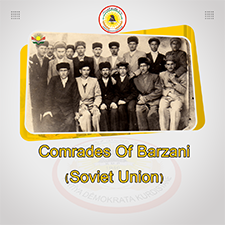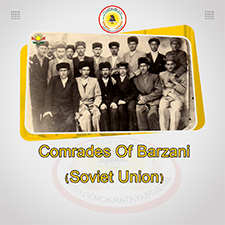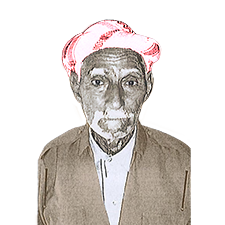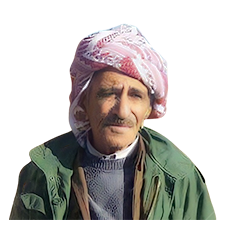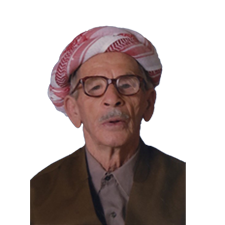Biography
Jamil Abdullah Hassan was born in 1925 in Avedur village of Barzan district of Mergasur district of Erbil province. In the Soviet Union, he married Gul Kara Aslan, whose Russian name is Pambukh Aslanov. They had two daughters, Nadia and Hadiya, who were twins, born in 1958. In 1975, after the collapse of the September Revolution, he was transferred to southern Iraq by the Ba'ath regime in Diwaniya province and later settled in the Erbil plain. On July 31, 1983, he was enforced to disappear during the Barzani Anfal operation by the Iraqi government in Qushtapa community.
Service record
On April 23, 1947, he left for the Soviet Union alongside Mustafa Barzani. After that, he was engaged in the Gali Qtur and Prdi Mako fights. After a long and much difficulty, on June 18, 1947, on the Iranian-Soviet border, Mulla Mustafa Barzani and his force crossed the Aras River.
Following their arrival in to Nakhchivan, Azerbaijan on June 19th, 1947, Mustafa Barzani and all of his companions were imprisoned for forty days. In fact, they were given the same treatment as prisoners of war in terms of food, clothing, and transportation while living in a camp which was surrounded by barbed wire and guarded by soldiers. Not long after, by decision of Soviet Union government, they were divided into groups and transferred to the regions of Aghdam, Lachin, Ayulakh and Kalbajar in the Republic of Azerbaijan. By December 10, 1947, they were moved to a military base on the Caspian Sea in Baku, the capital of the Republic of Azerbaijan. On the 23rd of the same month on the Caspian Sea in Baku, the capital of the Republic of Azerbaijan, Barzani's followers were organized into a military regiment and received training in military tactics and politics and taught to read and write Kurdish by their other educated Peshmarga. As a result of Jafar Bakirov's mistreatment, On August 29, 1948, Mulla Mustafa Barzani made the decision to relocate his military camp from Azerbaijan to the village of Chirchuk close to Tashkent, the capital of Uzbekistan, where they sustained their military training.
Following that, in March 1949, Mulla Mustafa and his friends were split up into groups and sent by rail to the countryside of the Soviet Union, where they worked on the kolkhozes' crops. (Land that people rented from the government and then returned to it).
Finally after much effort and sending several letters by General Barzani to Stalin, Stalin finally received a letter in which Barzani talked about the suffering of his comrades. Stalin immediately decided to form a committee to investigate the situation of Barzani's comrades. When the committee investigated the situation of Barzani's comrades, they decided to gather them all in Vrievsky. . As a result on November 1951, he went to Vrevsky, Soviet Union.
Once General Mustafa Barzani returns to Iraq after the revolution On July 14, 1958, he and his allies were got a general amnesty On February 25, 1959 in accordance with Articles 3 and 7, Paragraph (a) of Article 10, and Working with Article (11) based on the Amended Law No. 19.
In 1958, the Iraqi Republic was established under the leadership of Abdul Karim Qasim. Moreover, he returned to Kurdistan on April 16, 1959 with his comrades on the ship Grozya through the port of Basra in the south of the Iraqi Republic.
In 1975, after the collapse of the September Revolution, he was transferred to Diwaniya province in southern Iraq and later settled in the Erbil plain. On July 31, 1983, he was enforced to disappear by the Iraqi government during the Barzani Anfal operation in Qushtapa community.
Sources:
- حهمید گهردی، پوختهی مێژوونامه، چاپی یهكهم، (ههولێر - دهزگای چاپ و بڵاوكردنهوهی ئاراس - چاپخانهی وهزارهتی پهروهرده - ٢٠٠٤ز).
- ڕێكاری مزویری، ژنێن رۆس و ڕاگواستن و ئهنفال و كۆمهلكوژی، چاپی یهكهم، (ههولێر – چاپخانهی مناره - ٢٠١٠ز).
- ڕێكارێ مزویری، سهربۆرا تراژیدیایێن بارزانییان، چاپا یهكێ، (ههولێر - چاپخانا حاجی هاشم - ٢٠١٣ز).
- شهعبان عهلی شهعبان، ههندێك زانیاری سیاسی و مێژوویی، چاپی سێیهم، (ههولێر - چاپخانهی ڕۆژههڵات - ٢٠١٣ز).
- عهبدولڕهحمان مهلا حهبیب ئهبوبهكر، عهشیرهتی بارزان له نێوان ١٩٣١-١٩٩١، چاپی یهكهم، (ههولێر - چاپخانهی وهزارهتی رۆشنبیری - ٢٠٠١ز).
- عومهر ههمزه ساڵح، جینۆساید و تاوانهكانی ڕژێمی بهعس دژی بارزانییهكان ١٩٧٥- ١٩٩١ له زمانی شایتحاڵ و بهڵگهنامهكانهوه، چاپی یهكهم، (ههولێر - چاپخانهی ڕۆژههڵات – ٢٠١٧ز).
- كاروان محهمهد مهجید، بارزانییهكان له مههابادهوه بۆ سۆڤیەت، چاپی یهكهم، (سلێمانی - چاپخانهی پهیوهند - ٢٠١١ز).
- گۆڤاری ههتاو، ژماره ١٥٤، ساڵی شهشهم، ههولێر، چاپخانهی كوردستان، ههینی، ١٥ نیسانی ١٩٥٩.
- له یادداشتی فهرماندهی شههید حهسۆ میرخان ژاژۆكی، ٦٢ رۆژ لهگهڵ بارزانی دا چوونی بارزانییهكان بۆ یهكێتی سۆڤیەت، چاپی یهكهم (ههولێر - چاپخانهی رۆشنبیری - ١٩٩٧ز).
- لیث عبدالمحسن جواد الزبیدي، ثورة ١٤ تموز ١٩٥٨ في العراق، (بغداد - دارالرشید للنشر - ١٩٧٩م).
- مسعود بارزانی، بارزانی و بزوتنهوهی رزگاریخوازی كورد ١٩٣١- ١٩٥٨، (دهۆك - چاپخانهی خهبات - ١٩٩٨ز).
- نهجهف قولی پسیان، له مهابادی خوێناوییهوه ههتا لێوارهكانی ئاراس، و. شهوكهت شێخ یهزدین، چاپی یهكهم، (پیرمام - یۆبیلی زێڕینی پارتی دیموكراتی كوردستان - ١٩٩٦ز).
- ئـ.د.ئـ، فایلی ژماره AI-10، لیستی ههڤاڵانی مستهفا بارزانی بۆ یهكێتی سۆڤیەت، بهڵگهنامه لهلایهن سهگڤان هاڵۆ پێشكهش كراوه، ٢٠١٦ز.
- ئـ.د.ئـ، فایلی ژماره HB-47، پارتی دیموكراتی كوردستان، بارهگای بارزانی، لێژنهی باڵای ناوچهی بارزان، فۆرمی جهمیل عهبدوڵا حهسهن عهبدوڵا، پیرمام، ١ تشرینی دووهمی ٢٠١٨ز.




